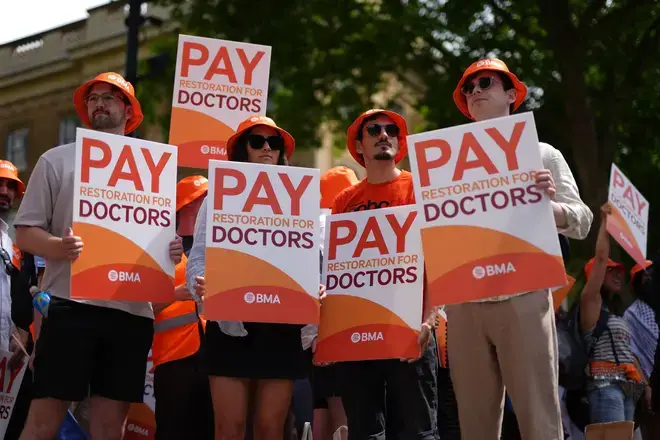Junior doctors may not be able to claim overtime shifts to make up for pay lost during the upcoming strike, as the new head of NHS England says medics must face the "financial consequences".
Thousands of doctors are expected to strike tomorrow to demand a 29 per cent pay rise, a figure the British Medical Association claims matches how much doctors’ pay has fallen since 2008-09.
Numerous NHS bosses have criticised those taking industrial action, with Sir Jim Mackey the latest to wade in, claiming doctors must not be "consequence-free".
Sir Jim said those looking to take on overtime to clear backlogs once the industrial action is over should be blocked from doing so.
He also said the NHS would be “much more resistant” to demands from the BMA, which is staging its 12th strike since March 2023.
The NHS chief told the public to continue using services as usual and urged hospitals to keep routine operations and appointments running.
In a call with hospital leaders on Wednesday, he said: "We’ve been very, very clear we want to have a different approach this time.
"You have noticed already we are in a different space compared to where we were last time, much more instructive to the BMA, much more resistant to their demands.
"Frankly we and you make decisions about safety, not the BMA. Do what you do best, make sensible decisions and we’ll stick together."
Hospitals and local teams have spent this week preparing for the strike, which is scheduled to begin at 7am on Friday, after five days of talks between the government and the BMA failed to deliver a compromise.
GP surgeries, urgent care and A&E departments will continue to operate as usual for those who need them, NHS England said.
For urgent but not life-threatening issues, the public has been told to use 111 online as the first port of call.
Prof Meghana Pandit, NHS England national medical director, said: “There is no doubt this industrial action will take a toll on patients and NHS staff, and it is disappointing it is going ahead.
"While it will mean some appointments won’t be able to go ahead as planned, we are doing all we can to limit this, and patients should continue to use NHS services in the usual way.
"The public should dial 999 in an emergency, and otherwise use 111 online, your local pharmacist or GP, and patients should attend NHS appointments unless told otherwise."
Last June, close to 62,000 inpatient and outpatient appointments were rescheduled following a resident doctors strike.
Almost 1.5 million appointments have been rescheduled since the end of 2022 as a result of industrial action.
The BMA has been clear that strike action will only be reversed if the Government improves its 5.4% pay offer.
Health Secretary Wes Streeting said he would continue talks with the union if they postpone the strike, but insisted that he wouldn’t increase his pay offer.
This failed to convince the doctors’ union, which maintains that their main reason for striking is to achieve better pay.
Dr Melissa Ryan and Dr Ross Nieuwoudt, co-chairs of the BMA’s resident doctors committee, said in a statement: "We have always said that no doctor wants to strike and all it would take to avoid it is a credible path to pay restoration offered by the Government.
"We came to talks in good faith, keen to explore real solutions to the problems facing resident doctors today.
"Unfortunately, we did not receive an offer that would meet the scale of those challenges.
"While we were happy to discuss non-pay issues that affect doctors’ finances we have always been upfront that this is at its core a pay dispute."


